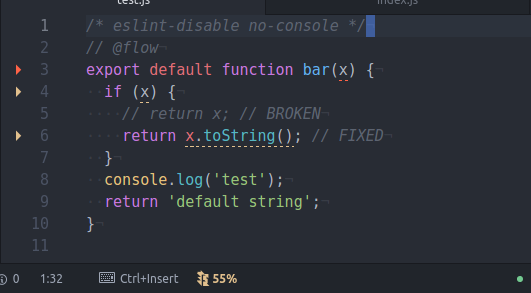Harden up Node.js with Flow: Part 2
We wrap up this series with editor integration and using third-party libraries.

This is part of a series starting with Harden up Node.js with Flow: Part 1, on using Flow to add the benefits of static typing to Node.js projects.
Editor Integration
Much like eslint, Flow can be integrated into a number of editors / IDEs; enabling some additional helpful features (would go as far as to say critical features). As I am using Atom, I chose to use Nuclide for these features.
Nuclide is a full IDE created by people at Facebook that has support for Flow built-in. It provides a linter, autocomplete and type coverage support, click-to-definition and type description on hover.
— Facebook Open Source Team
First, there is inline flow errors messages. Unfortunately, they only show up when saving; luckily I save often.

It also shows type definitions on hover. Here we can see that foo is a function with signature, (x: ?number) => string, or takes an optional number parameter and returns a string.

In addition, it indicates type coverage. Our earlier example has 100% type coverage (good). But a file with the following code has 55% type coverage (worse).
/* eslint-disable no-console */
// @flow
export default function bar(x) {
if (x) {
// return x; // BROKEN
return x.toString(); // FIXED
}
console.log('test');
return 'default string';
}In the editor, you can see which lines are contributing to the problem.

Third-Party Libraries
So far we have been using Flow without third-party libraries; they introduce some additional challenges.
If the third-party libraries could be simply Flow annotated, like our source code, things would be trivial, e.g.,
node_modules/mymodule/index.js
// @flow
export default function foo(x: ?number): string {
if (x) {
return x.toString();
}
return 'default string';
}The problem, however, is that Flow is not universally adopted and even then one does not typically transpile third-party libraries. In this case, one solution is if the module provides both a transpiled format and in the flow annotated format. In my sample module, Node.js will use the transpiled file and Flow will use the flow annotated version.
node_modules/mymodule/index.js
exports = module.exports = function foo(x) {
if (x) {
return x.toString();
}
return 'default string';
}node_modules/mymodule/index.js.flow
// @flow
export default function foo(x: ?number): string {
if (x) {
return x.toString();
}
return 'default string';
}The problem, however, is… What to do when the third-party library does not provide flow annotated format files? The answer is to use a library definition file (file in folder named flow-typed and with extension .js; otherwise naming is simply by convention), e.g.,
flow-typed/npm/mymodule_v1.0.x.js
declare module 'mymodule' {
declare module.exports: {
(x: ?number): string
}
}Flow-Typed
Because we don’t want to write library definitions for others’ third-party libraries there is flow-typed.
The flow-typed repo is a collection of high-quality library definitions, tests to ensure that definitions remain high quality, and tooling to make it as easy as possible to import them into your project.
— flow-typed team
Let us first see what happens when we use third-party libraries without a library definition. Let us use Express’ hello-world example.

Because Flow does not know the signatures of the Express library, our code’s type coverage suffers (42%). To resolve this we first install flow-typed, use it to install the appropriate library definitions, and use them in our code. (full example is available).
sudo npm install -g flow-typedFrom the project folder we run:
flow-typed install express@4.16.xnote: The available definitions are listed.
This will install the library definition into the file flow-typed/npm/express_v4.16.x.js.
With the library definition installed, Flow reports a number of errors; the first is with the get method call.

While I did not find the error message terribly helpful, I bumbled my way through the downloaded express_v4.16.x.js library definition to the proper syntax; was pretty tangled.
note: It is recommended that you commit the third-party library definitions into into your repository as they are changing rapidly (and not versioned themselves).
index.js
// @flow
/* eslint-disable no-console */
import express from 'express';
import type { $Request, $Response } from 'express';const app = express();
app.get('/', (req: $Request, res: $Response) => res.send('Hello World!'));
app.listen(3000, () => console.log('Example app listening on port 3000!'));
With this change, we only have one warning left:

Looking at the library definition, I am making the call correctly.
flow-typed/npm/express_v4.16.x.js
...
listen(
port: number,
hostname?: string,
callback?: (err?: ?Error) => mixed
): Server;
...Through hours of troubleshooting this warning, I found an incredibly useful resource that provides an index to the library definitions for Node.js itself.:
In the end, I was not able to get rid of the warning but did end up contributing a bit more information to an existing GitHub issue on the topic.
Wrap Up
The first time I tried to use Flow in a project (was a front-end React + Redux application), I got horribly tangled up in using the third-party library definitions; I ended up giving up.
Recently, in an effort to harden up my back-end code with static typing, I used Flow in a Node.js project and the experience was much better (up until I spent hours troubleshooting that single warning).
Bottom line, I am sufficiently satisfied with Flow (and expect it to get better) to not feel compelled to jump ship to statically typed server languages like the increasingly popular Go.
